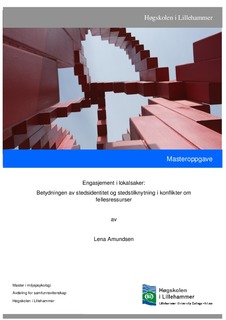| dc.description.abstract | The backdrop of this project is a conflict between local hydropower plant developers and recreational users of a river environment near the town of Lillehammer. The case study investigates the relationship between place identity, place attachment and engagement in the recreational users of the shared environmental resources. The sample consists of second-home owners and other leisure-time users of the area, and a mixed-methods approach was employed. Through interviews (N=25) and surveys (N=31), several predictors of engagement in the conflict were investigated. Results show that the variables age, the experience of a "Lillehammer identity", as well as a sense of responsibility, all predict the respondents' degree of engagement in the conflict. It is also shown that the extent of respondents' private discussions of the conflict predicts their perceptions of the formal, official management of the conflict. In conclusion, variables associated with place identity and place attachment clearly predict the respondents' perception of own engagement in the conflict. Place attachment and place identity may be best understood as indicators of the value and importance attached to a place by the local community. | nb_NO |
